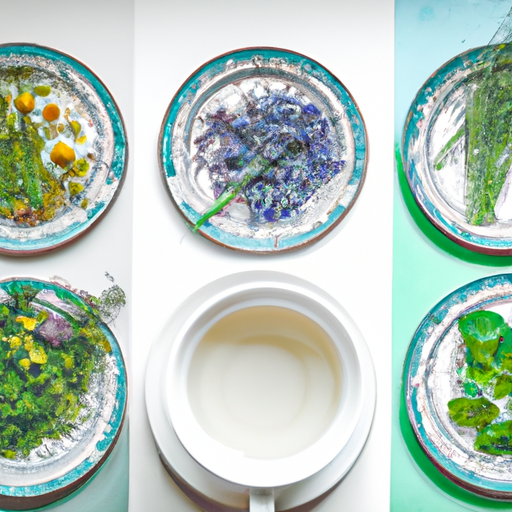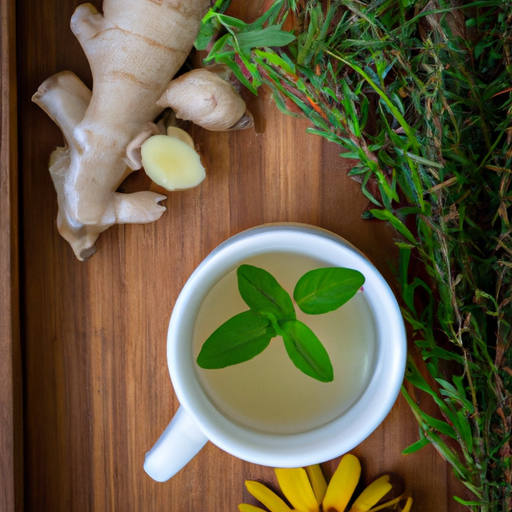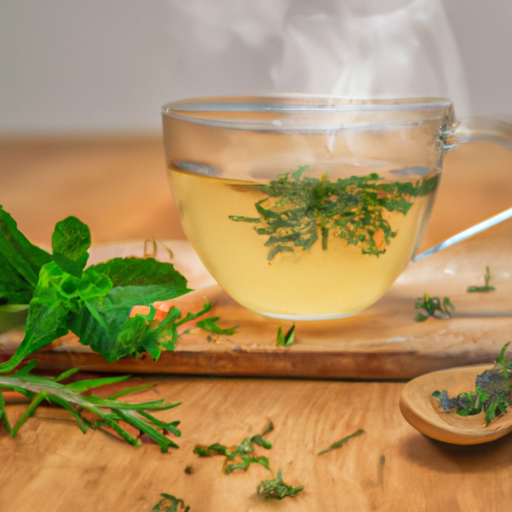You might be wondering, ‘What should I put in my herbal tea?’
Well, let me tell you, there are so many wonderful options to choose from! Some people might argue that herbal tea lacks the depth and complexity of traditional tea varieties. However, I am here to debunk that misconception and show you just how incredible herbal tea can be.
When it comes to herbal tea, the possibilities are endless. From calming chamomile to invigorating peppermint, each herb brings its unique flavor and health benefits to your cup.
Not only do these herbs taste amazing, but they also offer a range of holistic benefits. Whether you’re looking to relax, improve digestion, or boost your immune system, there’s an herbal tea ingredient perfect for you.
In this article, we will explore some of the most popular and beneficial herbs to add to your tea. Get ready to discover a world of soothing aromas, delightful flavors, and evidence-based wellness.
So, grab your favorite mug and let’s dive into the wonderful world of herbal tea!
Key Takeaways
- Herbal tea offers a wide variety of flavors and health benefits.
- Chamomile, peppermint, ginger, lemon balm, lavender, hibiscus, and rooibos are popular herbs to add to herbal tea.
- These herbs provide various benefits such as calming properties, improved sleep quality, digestion aid, stress and anxiety reduction, and antioxidant-rich properties.
- Rooibos tea is a particularly beneficial addition to herbal tea due to its caffeine-free nature, rich antioxidants, heart health benefits, anti-inflammatory properties, and promotion of healthy skin.
Chamomile: Known for its calming properties, chamomile is a popular choice for herbal tea. It has a floral and slightly sweet taste that can help relax your mind and body.
Chamomile’s calming and soothing effects make it a must-have ingredient for anyone looking to unwind and enjoy a cup of herbal tea. With its delicate floral aroma and slightly sweet taste, chamomile has been used for centuries to promote relaxation and relieve stress.
Research has shown that chamomile contains compounds that can help reduce anxiety and improve sleep quality. Sipping on a warm cup of chamomile tea before bedtime can be a wonderful way to wind down after a long day.
As we transition to the next section about peppermint, it’s important to note that chamomile and peppermint can be a delightful combination for those seeking both relaxation and a refreshing burst of flavor.
Peppermint: If you’re looking for a refreshing and invigorating flavor, peppermint is the way to go. It has a cooling effect and can aid in digestion and relieving headaches.
For an invigorating burst of flavor that’ll transport you to a cool, refreshing oasis, go ahead and add some peppermint to your cup of aromatic goodness. Peppermint isn’t just delicious but also offers numerous health benefits.
Its cooling effect can provide relief from digestive issues like bloating and indigestion. Additionally, peppermint’s been shown to help alleviate headaches and promote mental clarity. This herb contains menthol, which acts as a muscle relaxant and can help ease tension. Its soothing properties make it a popular choice for those looking to unwind after a long day.
As we transition to discussing ginger, keep in mind that adding a slice of this spicy root to your herbal tea can provide a warming kick and help soothe an upset stomach.
Ginger: Adding a slice of ginger to your herbal tea can add a spicy and warming kick. Ginger is known for its anti-inflammatory properties and can help soothe an upset stomach.
Ginger’s addition to your cup of aromatic goodness will infuse a spicy and warming kick, while also harnessing its renowned anti-inflammatory properties to soothe an upset stomach. This root has been used for centuries in traditional medicine for its healing benefits. Its active compounds, such as gingerol, have been shown to reduce inflammation in the body, making it an excellent choice for those experiencing digestive discomfort. Moreover, ginger can help alleviate nausea and vomiting, making it a go-to remedy for motion sickness and morning sickness during pregnancy.
As you sip on your ginger-infused herbal tea, you can feel confident that you’re not only indulging in a delightful flavor but also benefiting from its natural healing powers.
Now, let’s move on to lemon balm, an herb that offers a citrusy and refreshing flavor while aiding in stress reduction, digestion, and promoting better sleep.
Lemon Balm: This herb has a citrusy and refreshing flavor that can help reduce stress and anxiety. It can also aid in digestion and promote better sleep.
Lemon balm’s refreshing and citrusy flavor brings a burst of sunshine to your cup, melting away stress and anxiety, while also soothing your digestion and lulling you into a restful sleep. This herb is not only delicious but also packed with health benefits. Lemon balm has been used for centuries as a natural remedy for anxiety and insomnia. Research suggests that it may increase the production of GABA, a neurotransmitter that promotes relaxation. It is also rich in antioxidants, which can help reduce inflammation and protect against chronic diseases.
To highlight the benefits of lemon balm, take a look at the table below:
| Health Benefits of Lemon Balm |
|---|
| Reduces stress and anxiety |
| Improves digestion |
| Promotes better sleep |
| Contains anti-inflammatory properties |
Next, let’s explore the calming and soothing effects of lavender, known for its floral and aromatic taste that can help reduce anxiety and promote relaxation.
Lavender: Known for its calming and soothing properties, lavender can add a floral and aromatic taste to your tea. It can help reduce anxiety and promote relaxation.
Indulge in the calming and soothing effects of lavender, allowing its floral and aromatic taste to transport you to a state of tranquility, while reducing anxiety and promoting relaxation. Lavender has been used for centuries due to its numerous health benefits. Here are three reasons why lavender is a great addition to your herbal tea:
-
Stress reduction: Lavender has natural compounds that can help lower stress levels and promote a sense of calmness and well-being.
-
Sleep improvement: Drinking lavender tea before bed can aid in achieving a better quality of sleep, helping you wake up feeling refreshed and rejuvenated.
-
Digestive aid: Lavender has been found to soothe the digestive system, reducing symptoms such as bloating and indigestion.
Now, let’s move on to hibiscus. If you prefer a tangy and tart flavor, hibiscus is a great addition to your herbal tea. It’s packed with antioxidants and can help lower blood pressure and cholesterol levels.
Hibiscus: If you prefer a tangy and tart flavor, hibiscus is a great addition to your herbal tea. It is packed with antioxidants and can help lower blood pressure and cholesterol levels.
As we discussed earlier, lavender is a wonderful addition to herbal tea due to its calming properties and delightful floral taste. But if you’re in the mood for something with a tangy twist, hibiscus is the perfect choice. This vibrant flower adds a tart flavor to your tea and is packed with antioxidants. Not only does hibiscus give your taste buds a delightful zing, but it also benefits your health by potentially lowering blood pressure and cholesterol levels.
To give you a better idea of the benefits and flavors of these herbal teas, here’s a handy table:
| Herbal Tea | Flavor Profile | Health Benefits |
|---|---|---|
| Lavender | Floral, aromatic | Reduces anxiety, promotes relaxation |
| Hibiscus | Tangy, tart | Antioxidant-rich, may lower blood pressure and cholesterol levels |
Now, let’s move on to another herbal tea, rooibos. This caffeine-free beverage boasts a naturally sweet and nutty flavor. It is loaded with antioxidants and is believed to improve digestion and support healthy skin.
Rooibos: This caffeine-free herbal tea has a naturally sweet and nutty flavor. It is rich in antioxidants and can help improve digestion and support healthy skin
Rooibos, with its naturally sweet and nutty flavor, transports your taste buds to a cozy, indulgent corner of the world. This caffeine-free herbal tea isn’t just a delicious treat but also a powerhouse of health benefits. Here’s why you should consider adding rooibos to your herbal tea collection:
-
Rich in antioxidants: Rooibos is chock-full of polyphenols, which are potent antioxidants that can protect your body against free radicals and reduce oxidative stress.
-
Digestive support: The compounds in rooibos tea, like quercetin and luteolin, have anti-inflammatory properties and can help soothe digestive issues such as bloating and indigestion.
-
Skin health: Thanks to its high antioxidant content and minerals like zinc, rooibos tea can promote healthy skin by fighting oxidative damage and supporting collagen production.
-
Calming effects: Rooibos contains compounds that can help reduce stress and anxiety, making it a perfect drink to unwind and relax after a long day.
With its delightful taste and impressive health benefits, rooibos is a must-have addition to your herbal tea collection. Sip on this delightful brew and experience the wonders it can do for your well-being.
Frequently Asked Questions
Can herbal tea help with digestion and relieving headaches?
Yes, herbal tea can help with digestion and relieving headaches. Chamomile, ginger, and peppermint teas have been shown to soothe the digestive system, while peppermint and lavender teas can provide headache relief.
Which herb is known for its anti-inflammatory properties?
Turmeric is known for its anti-inflammatory properties. Adding it to herbal tea can provide relief from inflammation. It’s important to consult a healthcare professional before incorporating herbs into your routine.
Does lemon balm tea reduce stress and anxiety?
Yes, lemon balm tea can reduce stress and anxiety. It has been shown to have calming effects on the nervous system, promoting relaxation and improving mood. It’s a great addition to herbal tea blends.
What are the benefits of hibiscus tea?
Hibiscus tea offers numerous benefits, including reducing high blood pressure, improving digestion, and boosting immunity. It is rich in antioxidants and may help with weight loss. Overall, it is a delicious and healthy addition to any herbal tea blend.
Is rooibos tea caffeine-free?
Yes, rooibos tea is caffeine-free. It’s a soothing and refreshing herbal tea that can be enjoyed any time of day. Remember, as the saying goes, "A cup of tea is a cup of peace."
Conclusion
After exploring the various herbal tea options, I’ve realized that the possibilities are endless. From the calming chamomile to the invigorating peppermint, each herb brings its own unique flavor and health benefits to the table. By incorporating herbs like ginger, lemon balm, lavender, hibiscus, and rooibos into your tea routine, you can create a delightful and soothing experience.
So, why not indulge in the natural wonders of herbal tea and let it be your ally in promoting relaxation, digestion, and overall well-being?










